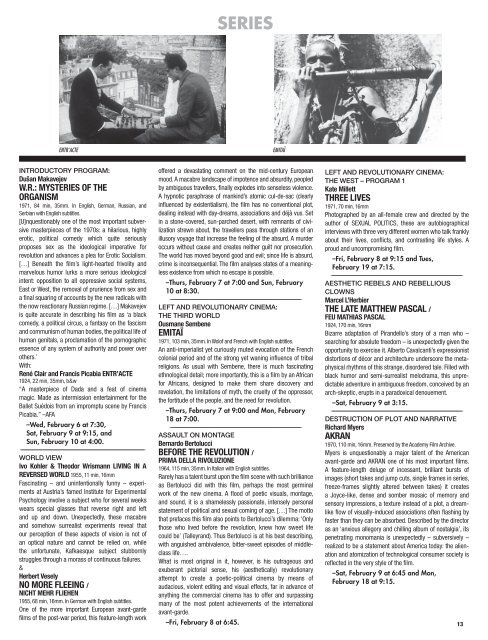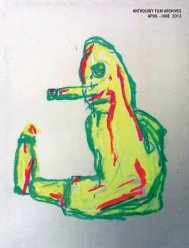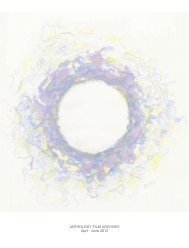quarterly pdf - Anthology Film Archives
quarterly pdf - Anthology Film Archives
quarterly pdf - Anthology Film Archives
You also want an ePaper? Increase the reach of your titles
YUMPU automatically turns print PDFs into web optimized ePapers that Google loves.
ENTR’ACTE<br />
INTRODUCTORY PROGRAM:<br />
Dušan Makavejev<br />
W.R.: MYSTERIES OF THE<br />
ORGANISM<br />
1971, 84 min, 35mm. In English, German, Russian, and<br />
Serbian with English subtitles.<br />
[U]nquestionably one of the most important subversive<br />
masterpieces of the 1970s: a hilarious, highly<br />
erotic, political comedy which quite seriously<br />
proposes sex as the ideological imperative for<br />
revolution and advances a plea for Erotic Socialism.<br />
[…] Beneath the film’s light-hearted frivolity and<br />
marvelous humor lurks a more serious ideological<br />
intent: opposition to all oppressive social systems,<br />
East or West, the removal of prurience from sex and<br />
a final squaring of accounts by the new radicals with<br />
the now reactionary Russian regime. […] Makavejev<br />
is quite accurate in describing his film as ‘a black<br />
comedy, a political circus, a fantasy on the fascism<br />
and communism of human bodies, the political life of<br />
human genitals, a proclamation of the pornographic<br />
essence of any system of authority and power over<br />
others.’<br />
With:<br />
René Clair and Francis Picabia ENTR’ACTE<br />
1924, 22 min, 35mm, b&w<br />
“A masterpiece of Dada and a feat of cinema<br />
magic. Made as intermission entertainment for the<br />
Ballet Suédois from an impromptu scene by Francis<br />
Picabia.” –AFA<br />
–Wed, February 6 at 7:30,<br />
Sat, February 9 at 9:15, and<br />
Sun, February 10 at 4:00.<br />
–––––––––––––––––––––––––––––––––––––––––––––––––––––––––––––––––––––––––––––––––––––––––––<br />
WORLD VIEW<br />
Ivo Kohler & Theodor Wrismann LIVING IN A<br />
REVERSED WORLD 1955, 11 min, 16mm<br />
Fascinating – and unintentionally funny – experiments<br />
at Austria’s famed Institute for Experimental<br />
Psychology involve a subject who for several weeks<br />
wears special glasses that reverse right and left<br />
and up and down. Unexpectedly, these macabre<br />
and somehow surrealist experiments reveal that<br />
our perception of these aspects of vision is not of<br />
an optical nature and cannot be relied on, while<br />
the unfortunate, Kafkaesque subject stubbornly<br />
struggles through a morass of continuous failures.<br />
&<br />
Herbert Vesely<br />
NO MORE FLEEING /<br />
NICHT MEHR FLIEHEN<br />
1955, 68 min, 16mm. In German with English subtitles.<br />
One of the more important European avant-garde<br />
films of the post-war period, this feature-length work<br />
SERIES<br />
offered a devastating comment on the mid-century European<br />
mood. A macabre landscape of impotence and absurdity, peopled<br />
by ambiguous travellers, finally explodes into senseless violence.<br />
A hypnotic paraphrase of mankind’s atomic cul-de-sac (clearly<br />
influenced by existentialism), the film has no conventional plot,<br />
dealing instead with day-dreams, associations and déjà vus. Set<br />
in a stone-covered, sun-parched desert, with remnants of civilization<br />
strewn about, the travellers pass through stations of an<br />
illusory voyage that increase the feeling of the absurd. A murder<br />
occurs without cause and creates neither guilt nor prosecution.<br />
The world has moved beyond good and evil; since life is absurd,<br />
crime is inconsequential. The film analyses states of a meaningless<br />
existence from which no escape is possible.<br />
–Thurs, February 7 at 7:00 and Sun, February<br />
10 at 8:30.<br />
––––––––––––––––––––––––––––––––––––––––––––––––––––––––––––––––––––––––––––––––––––––––––––––––<br />
LEFT AND REVOLUTIONARY CINEMA:<br />
THE THIRD WORLD<br />
Ousmane Sembene<br />
EMITAÏ<br />
1971, 103 min, 35mm. In Wolof and French with English subtitles.<br />
An anti-imperialist yet curiously muted evocation of the French<br />
colonial period and of the strong yet waning influence of tribal<br />
religions. As usual with Sembene, there is much fascinating<br />
ethnological detail; more importantly, this is a film by an African<br />
for Africans, designed to make them share discovery and<br />
revelation, the limitations of myth, the cruelty of the oppressor,<br />
the fortitude of the people, and the need for revolution.<br />
–Thurs, February 7 at 9:00 and Mon, February<br />
18 at 7:00.<br />
––––––––––––––––––––––––––––––––––––––––––––––––––––––––––––––––––––––––––––––––––––––––––––––––<br />
ASSAULT ON MONTAGE<br />
Bernardo Bertolucci<br />
BEFORE THE REVOLUTION /<br />
PRIMA DELLA RIVOLUZIONE<br />
1964, 115 min, 35mm. In Italian with English subtitles.<br />
Rarely has a talent burst upon the film scene with such brilliance<br />
as Bertolucci did with this film, perhaps the most germinal<br />
work of the new cinema. A flood of poetic visuals, montage,<br />
and sound, it is a shamelessly passionate, intensely personal<br />
statement of political and sexual coming of age. […] The motto<br />
that prefaces this film also points to Bertolucci’s dilemma: ‘Only<br />
those who lived before the revolution, knew how sweet life<br />
could be’ (Talleyrand). Thus Bertolucci is at his best describing,<br />
with anguished ambivalence, bitter-sweet episodes of middleclass<br />
life….<br />
What is most original in it, however, is his outrageous and<br />
exuberant pictorial sense, his (aesthetically) revolutionary<br />
attempt to create a poetic-political cinema by means of<br />
audacious, violent editing and visual effects, far in advance of<br />
anything the commercial cinema has to offer and surpassing<br />
many of the most potent achievements of the international<br />
avant-garde.<br />
–Fri, February 8 at 6:45.<br />
EMITAÏ<br />
LEFT AND REVOLUTIONARY CINEMA:<br />
THE WEST – PROGRAM 1<br />
Kate Millett<br />
THREE LIVES<br />
1971, 70 min, 16mm<br />
Photographed by an all-female crew and directed by the<br />
author of SEXUAL POLITICS, these are autobiographical<br />
interviews with three very different women who talk frankly<br />
about their lives, conflicts, and contrasting life styles. A<br />
proud and uncompromising film.<br />
–Fri, February 8 at 9:15 and Tues,<br />
February 19 at 7:15.<br />
––––––––––––––––––––––––––––––––––––––––––––––––––––––––––––––––––––––––––––––––––––––––––––––––<br />
AESTHETIC REBELS AND REBELLIOUS<br />
CLOWNS<br />
Marcel L’Herbier<br />
THE LATE MATTHEW PASCAL /<br />
FEU MATHIAS PASCAL<br />
1924, 170 min, 16mm<br />
Bizarre adaptation of Pirandello’s story of a man who –<br />
searching for absolute freedom – is unexpectedly given the<br />
opportunity to exercise it. Alberto Cavalcanti’s expressionist<br />
distortions of décor and architecture underscore the metaphysical<br />
rhythms of this strange, disordered tale. Filled with<br />
black humor and semi-surrealist melodrama, this unpredictable<br />
adventure in ambiguous freedom, conceived by an<br />
arch-skeptic, erupts in a paradoxical denouement.<br />
–Sat, February 9 at 3:15.<br />
––––––––––––––––––––––––––––––––––––––––––––––––––––––––––––––––––––––––––––––––––––––––––––––––<br />
DESTRUCTION OF PLOT AND NARRATIVE<br />
Richard Myers<br />
AKRAN<br />
1970, 110 min, 16mm. Preserved by the Academy <strong>Film</strong> Archive.<br />
Myers is unquestionably a major talent of the American<br />
avant-garde and AKRAN one of his most important films.<br />
A feature-length deluge of incessant, brilliant bursts of<br />
images (short takes and jump cuts, single frames in series,<br />
freeze-frames slightly altered between takes) it creates<br />
a Joyce-like, dense and somber mosaic of memory and<br />
sensory impressions, a texture instead of a plot, a dreamlike<br />
flow of visually-induced associations often flashing by<br />
faster than they can be absorbed. Described by the director<br />
as an ‘anxious allegory and chilling album of nostalgia’, its<br />
penetrating monomania is unexpectedly – subversively –<br />
realized to be a statement about America today: the alienation<br />
and atomization of technological consumer society is<br />
reflected in the very style of the film.<br />
–Sat, February 9 at 6:45 and Mon,<br />
February 18 at 9:15.<br />
13




